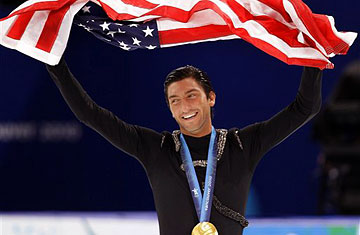
American Evan Lysacek skates during the victory ceremony after winning the gold medal at the Vancouver Olympics on Thursday, Feb. 18
What would the Flying Tomato do? If Shaun White could trade in his baggies for spandex and his board for a pair of quarter-inch blades (and maybe cut his hair) to compete in men's figure skating, would he do it? Would he do the quad?
Uh, yes. No question. This is the man who clinched the gold on Wednesday and bettered his winning run with a second drop-in featuring the daring, innovative and wow-inducing Double McTwist 1260. He didn't have to do it. But he did. Because he wanted to. Because it's the Olympics. Because that's the kind of competitor he is.
Where was that sense of daring and anxiety-triggering anticipation in the men's figure-skating final on Thursday? It certainly wasn't much in evidence on the ice in the Pacific Coliseum. There was great skating, certainly — American Evan Lysacek skated a solid, clean program that earned him enough points to skate past heavy favorite Evgeni Plushenko of Russia and cinch the gold. The right man won, no doubt. But the entire night, I felt something was missing. We didn't see anything akin to the inspired performance Sarah Hughes gave in 2002 in Salt Lake City to best Michelle Kwan, or the house-rousing skate that Alexi Yagudin threw down that same year to claim the men's title. Something was missing, something that must have gotten stuck somewhere in the new computers the judges use to punch in their elements scores, and their skating-skills scores, and their transition and linking footwork marks, and their performance and execution scores — and let's not forget that catch — all assessment of "interpretation."
Don't get me wrong. Unlike many who follow the sport (and even some skaters themselves), I'm actually a fan of the new scoring system, the "code of points," first used in Torino. I think it's raised the level of skating skill to impressive levels in ways that don't always come across on television. The edges are sharper and deeper, the footwork is cleaner and crisper, and the spins are tighter and, frankly, more like spins than the squats some skaters were getting away with for years.
But one casualty in raising the technical precision of the sport is the spontaneity that makes sports exciting. Athletes at this level live on the edge of control and chaos, and it's the collective wow of moments when they butt themselves up against that line that take our breath away and keep bringing us back to watch. "It's important for any sport to continue to raise the bar and move forward," Paul Wylie, a 1992 silver medalist, told me after the men's short programs. "I have to admit, as a performer who did two triple Axels in my program in Albertville, I am surprised that more guys aren't doing the quad."
Ah, yes, the quad. It's been a hot topic among skating fans this entire week — this entire season, really — as the arguments go back and forth over whether a quadruple jump of any kind is necessary in the men's program or amounts to nothing but showboating. Lysacek decided, coming into Vancouver, not to include one in his program; he tried it at the U.S. nationals in January and fell. But he's the only skater among the top competitors who made that decision, sparking all kinds of buzz among the skating cognoscenti about whether he was pushing the sport back.
Regardless of where you weigh in on the debate, that's the thing that should be worrying skating officials and athletes alike: that the scoring system may be sucking out the drive and inspiration for innovating and evolving the sport that jumps like the quad represent. The stricter scrutiny that the system places on the execution of elements is biasing skaters to play it safe and skate programs that are constructed — move for move, from fingertip to toe point — with an almost passionless precision.
